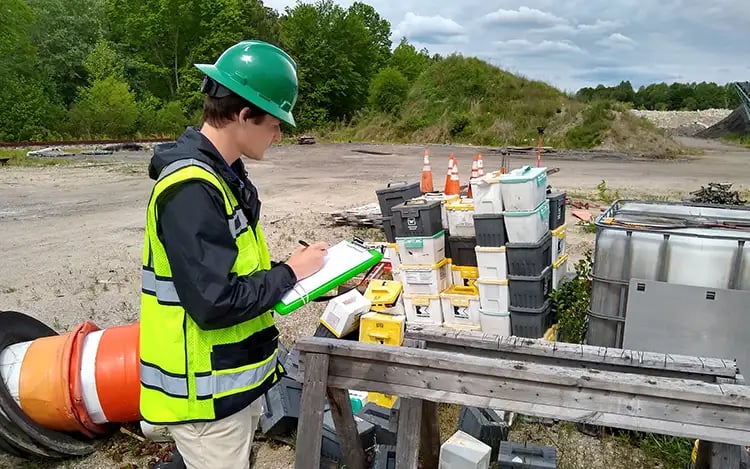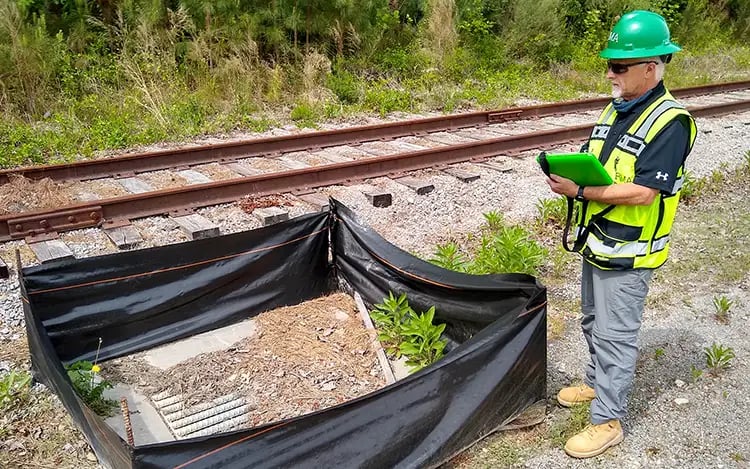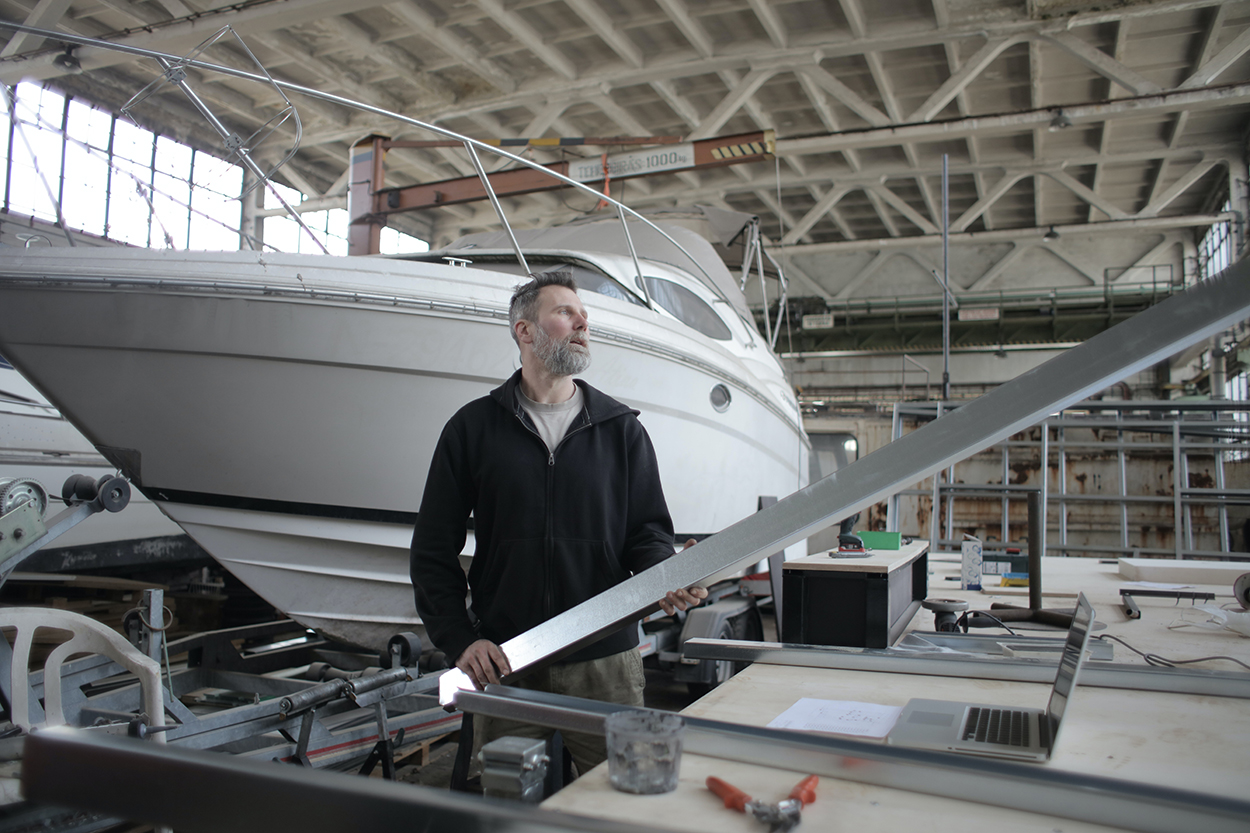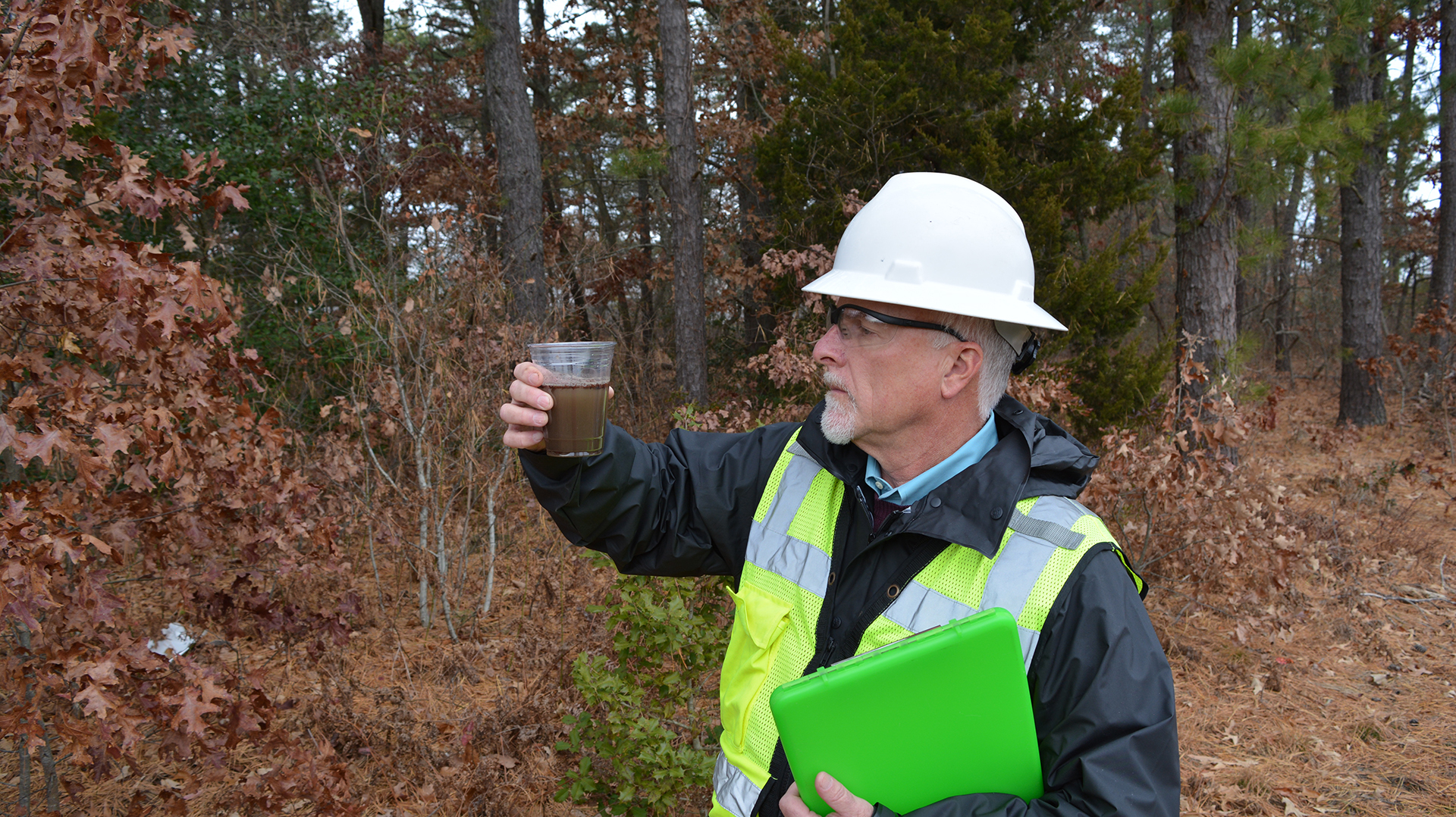Learn how North Carolina industrial operations are relegated by NPDES stormwater permitting regulations.
When it comes to running a business in North Carolina, from Hatteras to Asheville to the Research Triangle and everywhere in between, various types of industrial operations fall under "stormwater permit" regulations. If you're unsure what that means, or how these permits impact your facility, you're not alone. With one of the east coast's most complex NPDES stormwater permitting programs, North Carolina makes getting into compliance with these regulations somewhat tricky.
If you're new to the world of NPDES stormwater permits in North Carolina, want a refresher, or are just finding out you need one and don't know where to start, you've come to the right place. Let's dive in and discuss some of the basics regarding North Carolina's complex stormwater permitting program.
Who needs an NPDES stormwater permit in North Carolina?
There are multiple industrial stormwater permits in North Carolina, and each permit is specific to a type of industry, such as asphalt paving, marinas and shipbuilding, landfills, treatment works, and much more. These "general" permits are general because they cover all different types of similar operations. If you fall into one of these industries, you'll need a stormwater permit. Conversely, there are "individual" stormwater permits available for commercial and industrial facilities that don't fit the mold.
Point is, no matter what your industrial (or again, sometimes commercial) facility does or how it's classified, it's worth further evaluating your stormwater permitting needs. If your operation falls within a certain group of SIC codes, or the State of North Carolina just demands you get one, then your industrial facility will need an NPDES stormwater permit.
What is a Construction General permit in North Carolina?
Bear in mind, that there are also construction-related stormwater permits, but here today we are strictly discussing INDUSTRIAL stormwater permits, not permits related to construction activities.
A construction general permit for stormwater is not the same as an industrial stormwater permit. The construction general permit is for land disturbing activities that are greater than one acre. This permit will generally require more routine inspections, stabilization measures for worked areas, and more construction-specific best management practices (BMPs) in order to curb sedimentation and excess erosion.
Do I ALWAYS need a stormwater permit in North Carolina?
Not always! There are some exceptions, which are called No Exposure Certifications in North Carolina.
As you can likely imagine, these "certifications" prove that your facility doesn't "expose" materials or processes to stormwater, meaning you (in theory) can't impact the quality of that stormwater.
In short, everything you do, and store, must be inside or otherwise covered and out of the way from stormwater, with almost no exceptions. For example, an open dumpster isn't allowed, while a dumpster with a lid may be approved on a case-by-case basis, whereas those compactor dumpsters totally sealed from the elements would be ok to operate under a No Exposure Certification.
There's a catch - you can't just claim no exposure and get off scot-free. You will still get inspected, and still have to maintain a certain level of documentation proving you continually qualify for a No Exposure Certification in North Carolina.
In instances where this is a viable option, it's a great choice. For everyone else, you can't fool the state (you'll do the opposite and make them angry), meaning you'll need to obtain NPDES permit coverage for your industrial operation in North Carolina.

What’s an "industrial stormwater permit"?
An industrial stormwater permit is an NPDES (National Pollutant Discharge Elimination System) permit that allows an industrial facility (and sometimes commercial operations) to discharge stormwater from its property.
In short, it's permission to "pollute", within reason. These permits say we get it, rain lands and flows off your property, but in doing so picks up pollutants (oil, grease, dirt, sand, chemicals, raw materials, etc.,) you're responsible for, and then leaves your property "dirty". A stormwater permit in North Carolina addresses how dirty the stormwater leaving your site can be.
We often hear from facilities across North Carolina that "regulating rain" is impossible - and you're right! However, stormwater permits regulate the stormwater leaving your site, not the rain landing on it. For this reason, most of the time when you hear "stormwater permits", it's referring to a general or generic stormwater permit, that regulates stormwater discharges, from a variety of industrial operations.
.webp?width=750&name=nc_npdes_s%20(1).webp)
What "discharges" are allowed under an NPDES permit?
Each industrial general permit authorizes different types of discharges depending on the activity. In the majority of instances, non-stormwater (process water or wastewater) discharges are NOT allowed. One notable example is the NCG14 Ready Mixed Concrete Stormwater Permit, which allows for process water discharges from equipment washout and the wetting of raw material stockpiles.
When it comes to individual NPDES permits, your options are much different. As you may guess, if you need an individual permit it's going to cost more, and more have individual requirements for your facility. Generally speaking, any non-stormwater discharges will need heightened monitoring and sampling, meaning your facility will be more closely monitored by the DEQ due to unique permitting requirements, and spend more to discharge all that water.
How long does an industrial stormwater permit last in North Carolina?
Industrial general stormwater permits all are active for a five-year period. This means that if the permit was issued in 2020, it will be active for another 5 years. Facilities that gain coverage under one of these industrial permits in say, 2022, will then only have 3 years of permit coverage because the state-issued permit expires in 2025.
Even though the "permit" can expire, it will remain in effect until a new permit is issued, or your industrial facility in North Carolina can obtain coverage under a different NPDES permit (such as an Individual North Carolina NPDES Permit).
There are numerous stormwater permits, meaning there are numerous issuance and expiration dates, all depending on the specific permit.
What are the requirements of an industrial stormwater general permit in North Carolina?
It depends! However, there are numerous requirements that every NPDES stormwater permit in North Carolina will establish for permittees, but the specific requirements are going to be permit specific.
For the most part, industrial stormwater permits here in North Carolina are similar to stormwater permits in other states, in that they follow a similar pattern with recordkeeping, monitoring, testing, sampling, and submittal requirements. This is because stormwater permits are based on Federal level NPDES permitting requirements.
The 5-second explanation of what this means is the Federal government says "industrial facilities need stormwater permits that do X, Y, and Z in order to protect the environment". State's then get to say ok, this is good enough, or this is just a starting point and we're going to add A, B, and C to the permit requirements". States can have tougher requirements compared to the Federal government, but they can't be weaker.
North Carolina, like many other states, has made changes to Federal permit requirements to fit state-specific needs. Below are some of the common, documented requirements inherent to industrial stormwater permits in N.C.
- Stormwater Sampling – For the majority of industrial operations, sampling will be required at stormwater discharge outfalls to ensure that your stormwater runoff is not polluted above State of North Carolina limits. This means collecting samples, analyzing them (via a variety of methods, including sending samples to analytical labs for testing), and recording results. This is commonly called stormwater monitoring, stormwater sampling, stormwater testing, etc.
- Stormwater Result Reporting - Once you get all this data, you're going to need to report it to the State of North Carolina via DMRs, or Discharge Monitoring Reports. As you can guess, you tell the state what your sample results are via forms, done on a regular basis, depending on your stormwater permit requirements. They'll keep tabs on your results, and if they're bad, expect the state to come knocking.
- Routine Inspections – One of the simplest requirements, you walk around the facility and document stormwater-related areas of your property, ranging from your stormwater discharge outfalls to areas that could impact stormwater quality, such as places where fuels are dispensed, stockpiles, trash bins, etc.
- Recordkeeping – Everything we're talking about here requires recordkeeping. We tell our clients, it's 2022, scan and save all your records FOREVER. At a minimum, save them for 5 years to be safe. Some records need to be updated daily, while others are only looked at annually. It all depends.
- Annual Stormwater Training - Every stormwater permit requires training. You, anyone working on your facility's stormwater program, your backup, etc., should all get trained on the permit, your SWPPP, and permit requirements. Not only is this a requirement, but if you're for whatever reason or one of your plant managers responsible for something stormwater-related quits, personnel issues don't provide an excuse for non-compliance.
- Annual Fees - Nothing in this life is free, and while considerably cheaper than in other states, it will cost you an annual fee here in North Carolina to have and be part of the NPDES stormwater permitting program.
- Stormwater Permitting Variables - Depending on your permit & operation, you may have additional requirements throughout the year, often dependent on your best management practices (BMPs). These could include sweeping your facility's yard, installing hay bails for water filtration, or other regularly occurring or as-needed activities to help improve the water quality of your stormwater runoff.
Will I get inspected for having an NPDES stormwater permit in North Carolina?
You bet. Once you're in the system with the DEQ, you can expect regular inspections to occur in some manner at your facility. For certain operations, this could be very common, happening a few times a year. For other industrial stormwater permit holders, you may only see your inspectors every few years or so. It all depends, but the answer regardless is yes, you can expect to get inspected at any time once you obtain coverage under a stormwater permit here in North Carolina.

How do I get an industrial stormwater general permit in North Carolina?
The million-dollar question, right? The best way to describe the process is to make an analogy - getting an industrial facility covered under a stormwater permit in North Carolina is like filing your own taxes.
They both involve a fair amount of paperwork. They both rely on unique knowledge to do them correctly. For some people in certain situations, it's an easy and quick process. For others, it can take a long time and be extremely confusing. For some people, they can absolutely go the DIY route and do all the necessary paperwork correctly themselves. For others, it's not worth the time and aggravation, so their best bet is to hire an expert to do things quickly, efficiently, and correctly.
To be frank, you either do it yourself by submitting plenty of paperwork, developing documents, and starting your stormwater program, or you hire help. If you want to go the DIY route, there's a lot involved, and from our experience, it's usually a more complex process than most businesses will want to handle on their own unless they have a dedicated and knowledgable environmental professional on staff. It involves paperwork, making documents, setting up accounts, talking with state agencies, possibly needing engineering and/or land surveying work, occasionally some discussions and negotiations with the State of North Carolina, and much more. Again, for some, this is possible, for others this is more than they can handle.
Whether or not you should hire an environmental professional (or in the analogy, an accountant) is going to depend on the permit, your facility's complexity, your experience & understanding, and how much time & money you want to throw at either figuring this out on your own. If you have all the time in the world, go for it, this isn't rocket science. For everyone else, call an expert and get it done right.
Do I need a professional engineer, land surveyor, licensed geologist, or other "certified" professional to get a stormwater permit?
For the most part, no, you don't. Unless there are overriding, specific requirements, you need additional work such as surveying, or some additional specifications are placed on your NPDES permit, a PE or licensed geologist is not required as part of the permitting process. This can be done by any capable and knowledgeable individual, familiar with stormwater permits.
There are some times when you may need outside help, such as with stormwater sampling and testing. Chances are pretty good your industrial operation doesn't have an analytical lab on-site, meaning you'll need to get your stormwater samples tested by a certified laboratory within North Carolina. There are some times when an engineer may need to be involved. It all depends, but for the most part the answer is no.

Are There Different Types of stormwater permits in North Carolina?
Yes! In fact, there are more stormwater permits available in North Carolina than in most other states! While many state-level environmental agencies issue what's called a MSGP (such as South Carolina's MSGP Stormwater Permit) that covers every industry, North Carolina issues general permits applicable to targeted industries. The are:
- North Carolina NPDES Stormwater General Permits - Covering a specific industry or group of industries.
- Individual NPDES Permits - For operations that don't fit into one of the General Permits.
- Construction Permits - For properties under construction activities. Just a note here - a construction permit does not roll over once construction is done. You need to get a new, industrial facility permit for your operation.
- No Exposure Certifications - For operations that would need a stormwater permit, but operate entirely indoors, meaning they aren't exposed to stormwater.
Here's a pretty thorough list of the types of industrial facilities needing general stormwater permits here in North Carolina:
How much does a stormwater permit in North Carolina cost?
Most industrial stormwater permits in the state have an application fee of $100 and an annual fee of $100 as well. Cheap, right?
It doesn't stop there. When you take your stormwater samples, it will cost you money to get your samples analyzed at a lab. Figure a few hundred dollars each time this happens.
How are you getting covered under this permit? If you're hiring an expert, figure that will cost you a few thousand right out of the gate (more on that below).
Can you conduct training for your staff, or should you buy online training courses to watch? Can you take your own stormwater samples, or is it easier & cheaper to hire a local lab to collect your samples? Do you need to do anything at your property, like hire a sweeping service to sweep your property, or install hay bails on a regular basis at stormwater discharge points? All of these things can add up every year, year after year.
Generally, stormwater permits can cost a few thousand dollars the first year (for small to medium-sized businesses in North Carolina), to tens of thousands or more for large, complex, or unique facilities. Every year after that, expect to spend at least a thousand dollars or so on basic compliance requirements, again with larger, more complex operations having much higher annual stormwater permit-related costs here in North Carolina.
Let's talk about other stormwater permit cost considerations.
I throw this out there all the time because this perpetually gets industrial operations in trouble.
Once you are in the system for a stormwater permit in North Carolina, you are "on the radar" with the DEQ. That means, your facility is now a data point, being compared to other data points. You're going to get inspected by regulators. You're going to have people take notice that your industrial facility has a stormwater permit.
This means you are going to be open to scrutiny about your operation, and what else may apply. Inspectors may compare your operations to others to see who's doing what, or may be cross-trained to be able to determine compliance regarding different regulations.
The simple fact is once you get a permit for whatever reason, it's extremely common for the rest of the departments, agencies, regulators, you name it, to come knocking, and let you know there are other environmental regulations that apply to your industrial operation. Some of the most common regulations that may be introduced as you get into compliance are:
- Air Quality Permits - Many types of industrial operations, processes, and equipment in North Carolina need an air permit. These are more common that stormwater permits!
- SPCC Plans - A simple guidance document put together to help prevent oil spills, and explains how to respond in case of one. This is sometimes asked for by local or county-level departments for various permitting, tank registration, or construction reasons. These are about as common as air permits since the applicability threshold is so low.
- Tier II Reporting - A pretty simple reporting requirement, you tell local emergency response organizations about the hazardous materials you store on site. This way if there's an emergency, first responders know they aren't walking into a ticking timebomb at your facility. Again, this is almost as common as air permits & SPCC plans, with the added perk of helping to keep our community members safe in an emergency. This is similar in fashion to the two elements of the Hazardous Chemicals Right-to-Know Act here in North Carolina, which is comprised of the Public Safety & Emergency Response Right-to-Know, and Community Right-to-Know.
- TRI Reporting - This is another reporting requirement, but is sent to the Federal government instead of your local agencies. This is a much more complex reporting requirement regarding hazardous chemicals within the products you use, store, and manufacture on-site. Not as common as the above three, but still worth discussing.
Getting on the radar with any regulation is just the beginning. It could take a few weeks, months, or even a year or two for others to take notice, but trust us, if you need anything else regulation-wise, eventually, someone from the government will let you know.

How much does it cost to hire a stormwater expert in North Carolina?
The cost to hire a stormwater permit expert in the State of North Carolina will depend on several factors, namely:
- The industry you operate in. The first step is to see if anything MAY apply to you, otherwise, a more complex, time-consuming individual stormwater permit may be needed, therefore raising the price.
- Facility-specific details. Is your operation typical for your industry? If so, you can probably use a general industrial stormwater permit. If not, again an individual permit may be your only option.
- Where is your facility located? If you hire an expert from Ashville but need help in Wilmington, you can expect to spend more money hiring someone simply due to travel considerations.
- Who are you hiring? If you're getting the top consultant of a multi-national firm operating out of a glass and chrome skyscraper, you can expect to spend more compared to the local stormwater expert.
- How much help do you need? We've helped industrial operations, that weren't savvy in any manner, get into compliance. They tend to need more hand-holding and professional assistance during the process compared to professionals who may have a baseline understanding of environmental regulations and understand what's needed to get into compliance.
- How big is the project? The economy of scale can make things cheaper on a per-unit level even though the overall project cost gets higher. Just like many things in life, spreading costs over many "things" can help keep the individual price low. For example, if you need an NPDES stormwater permit, air permit, SPCC Plan, and your first year of Tier II reporting completed, you will spend more, but likely get a lower price on your NPDES stormwater permit since you're bundling a whole bunch of services together at once.
- And more! If you're hiring an expert to take care of your permit ahead of time and be proactive, it should be a quicker and easier (therefore, cheaper) project, compared to someone being hired after your operation has dealt with issues, violations, or penalties from the DEQ over a matter of time. If you need something done ASAP, or your project is going to require a lot of time on-site or in a conference room, again, expect to spend more.
Having said that, the average cost to hire a stormwater permit expert in North Carolina is going to range from $1,500 or so to well over $10,000, all depending on the specifics of your project. For example, simple, local marinas here in North Carolina, needing the NCG19 Stormwater Permit, can expect to pay a lot less than landfills needing the NCG12 permit.

Forget it! Can I get in trouble for not having a stormwater permit in North Carolina?
Of course. In the same way you can get in trouble for speeding or not paying your taxes, you can absolutely get in trouble for not having a stormwater permit at an industrial facility in North Carolina. Stormwater permits are mandated by law, and by not getting them, you're breaking the law. Plain & simple.
Not only can you get in trouble for not having a stormwater permit here in North Carolina, but you can also potentially get in BIG trouble.
- The maximum penalty for non-compliance is roughly $50,000 per day, per violation. Let's say you run two locations, and there are two compliance items they specifically get you for at each facility. Now let's say they hit you with a 60-day period of non-compliance. Let's do the math, that's 2 x 2 x 50,000 x 60... that's $12,000,000! Even if you settle for a fraction of that, after hiring legal counsel, environmental consultants, etc., you're still looking at hundreds of thousands of dollars in costs.
- There is also (in extreme cases) the possibility of criminal charges, including jail time. I want to again stress, EXTREME CASES. As crazy as that sounds, every year we hear about some really bad, flagrant violations that end up sending some people to jail.
- The public can sue you if you don't have a permit. Again, may sound crazy, but citizens can sue your company if you aren't in compliance. And again, we see this happening every year. In fact, from our experience, citizens are better organized, more diligent, and more focused than the government - we often say your biggest environmental threat is the general public! Especially if you aren't in compliance! We go into that in detail in our article - Protect Your Company from 3rd Party Citizen Lawsuits
Just like any other law out there, you have to follow it, otherwise, yes, you can get in trouble, and sometimes you can get in big trouble.
Even if you're already in operation - get a stormwater permit ASAP.
Even if you're up and running 100%, and are just finding out you're missing something, don't delay! Every day you're out of compliance you risk your organization, your staff, your reputation, your bank account, your customers, you name it!
If you need help getting your facility squared away, aren't sure where you stand, or just don't want to deal with this environmental stuff, let's talk. We'd love to learn how we can help. Feel free to reach out to us here at info@rmagreen.com, call us anytime at 888-RMA-0230, visit our contact us page, or fill out the form below. Even if we aren't the stormwater experts right for you, we can still help guide you in the right direction towards compliance.

.webp?width=750&name=nc_npdes_s%20(1).webp)





